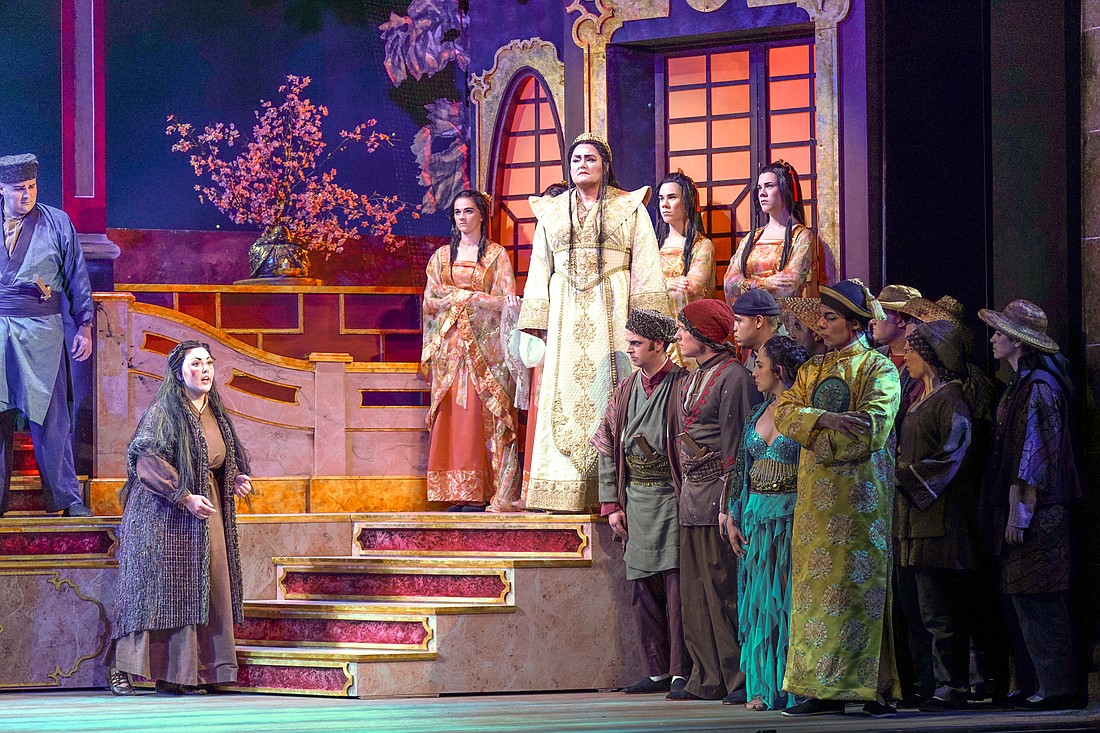- April 2, 2025
-
-
Loading

Puccini’s “Turandot” is much more than “Nessun dorma,” “In Questa Reggia,” or “Signore Ascolta,” its best known arias, or the gargantuan sets of Franco Zeffirelli in his well-known Metropolitan Opera production. It is about the people involved in this story of ancient China.
With the expert and sensitive direction of Stephanie Sundine, the sympathetic and excellent conducting of Victor DeRenzi, and a cast of outstanding singing actors, the opening night audience was given one of the most moving and outstanding performances of this opera that I’ve yet seen.
This ancient story of the Ice Princess who condemned suitors who could not answer her three riddles, only to be vanquished by an unknown prince who not only solved the riddles, but conquered her heart, has long been known as a “big” opera to produce. Mounting a production of “Turandot” is not for lightweights. It requires maximum skill, effort and talent from everyone involved.
When the Sarasota Opera first produced “Turandot” in 2013, it was obvious that everyone was thinking, “Is this company up to this?” or, “Can we get all of this opera on that not-exactly-big stage of the Sarasota Opera House?” Of course, the answer was a resounding “Yes,” but it was still a big stretch for all involved.
Last Saturday night there was a feeling of electricity in the air even before the house lights dimmed, and when the orchestra gave forth those opening chords and the curtain rose, a great feeling of “We’ve got this one!” engulfed the audience.
Those original sets had been reworked and redone by Michael Schweikardt, Howard Tsvi Kaplan’s costumes were even more sumptuous than before, and Ken Yunker’s musical palette of lighting were all in place for an entirely new experience.
All the roles were beautifully cast, and everyone was in good voice and ready for this opening night. Once again the first voice we heard, Jared A. Guest as a Mandarin, set a vocal standard for the evening with his stentorian proclamation to the populace of Peking.
There were two returning principals from the earlier production, Jonathan Burton as Calaf, the Unknown Prince, and Young Bok Kim as Timur, his father. Both artists have grown vocally and dramatically in the interim, especially Kim, whose Timur was heartbreaking as he mourned the death of the slave girl Liù.
New to this production were Kara Shay Thomson as the Princess Turandot and Anna Mandina as Liù.
This is Thomson’s seventh season with Sarasota Opera, and probably her best outing yet. The role of Turandot, though involved in only a few major scenes, is one of the most demanding for sopranos, and she carried it off well. It lies high in the voice and the singer must really know how to pace and conserve for the big moments. Thomson did all this and more, showing the gradual thawing of her icy princess and final capitulation to love in the final scene. In every way a standout performance.
Equally effective was Mandina as Liù, the young slave who kills herself rather than give up the name of the prince she loves. Her final scene of forbearance to torture was a most moving moment in the opera.
Of course, Burton brought down the house with his ringing “Nessun Dorma,” the aria that has been sung so much by everyone that it has made a place in pop culture. But he was also a most moving figure of courage, confidence and sympathy in his interaction with his other colleagues.
The three ministers, Filippo Fontana as Ping, Samuel Schlievert as Pang and Ganson Salmon as Pong, were again treated as more than mere commedia dell’arte figures as they alternately planned weddings or funerals, and then yearned for the homelands they had left.
A special treat was the appearance of Executive Director Richard Russell as the Emperor Aloum, reminding us of his singing past as an apprentice, studio and principal artist with Sarasota Opera.
In her staging of this production, Sundine has given every performer a life, from the hoards of the populace of Peking to the entangled lives of the principal roles. We learned about the characters as people and felt their emotions, rather than as mere participants in an extravagant spectacle.
The choruses, trained by Roger Bingaman and George Hemcher, sang forth with confidence and gusto, and had personality and motivation, rather than just standing and singing.
And, of course, there is that transcendent score of Puccini, himself a master of theater, musical mood and characterization. DeRenzi’s orchestra was transparent and revealed many qualities of the score that seemed unheard before.
We know Puccini was inspired by a music box for Turandot’s theme, but his complete musical voice in this opera revealed how much he had absorbed from his composing colleagues in other countries. In addition to the Asian themes and motives, I could hear traces of Debussy, a bit of Ravel, and other contemporaries who were developing an impressionistic style. One could almost call this “Italian Impressionism,” with all the wonderful chords and moods that were produced.
In fact, in this performance the difference between Puccini’s writing and that of Alfano, who completed the opera after Puccini’s death, was obvious in that the melodies of Puccini’s sketches were there, but the musical “voice” of the maestro was stilled and not duplicated.
Yes, this is a lot of writing, and I could go on and on, because I found this to be just about as close to perfect as an operatic performance can be.
There are 12 more performances of “Turandot” in the season, so I’d say hurry to get a ticket now.